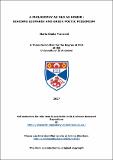A philosophy as old as Homer : Giacomo Leopardi and Greek poetic pessimism
Abstract
The aim of this thesis is twofold: it explores Giacomo Leopardi’s (1798-1837)
interpretation of, and engagement with, Greek pessimistic thought and, through him, it
investigates the complex and elusive phenomenon of Greek pessimistic thought itself.
This thesis contends that Greek pessimistic thought – epitomised by but not limited to
the famous wisdom of Silenus, the µὴ φῦναι topos – is an important element of Greek
thought, a fundamental part of some of Greece’s greatest literary works, and a vital
element in the understanding of Greek culture in general. Yet this aspect of ancient
thought has not yet received the attention it deserves, and in the history of its
interpretation it has often been forgotten, denied, or purposefully obliterated.
Furthermore, the pessimistic side of Greek thought plays a crucial role in both the
modern history of the interpretation of antiquity and the intellectual history of Europe; I
argue that this history is fundamentally incomplete without the appreciation of
Leopardi’s role in it. By his study of and engagement with ancient sources Leopardi
contributed to the 19th century rediscovery of Greek pessimistic wisdom, alongside,
though chronologically before, the likes of Arthur Schopenhauer, Friedrich Nietzsche,
and Jacob Burckhardt.
Having outlined some fundamental steps in the history of the reception of Greek
pessimism, this thesis examines the cardinal components of Leopardi’s reception of it:
his use of Greek conceptions of humanity to undermine modernity’s anthropocentric
fallacy, his reinterpretation of the Homeric simile of the leaves and its pessimistic
undertones, and his views on the idea that it would be best for man not to be born.
Type
Thesis, PhD Doctor of Philosophy
Collections
Items in the St Andrews Research Repository are protected by copyright, with all rights reserved, unless otherwise indicated.

